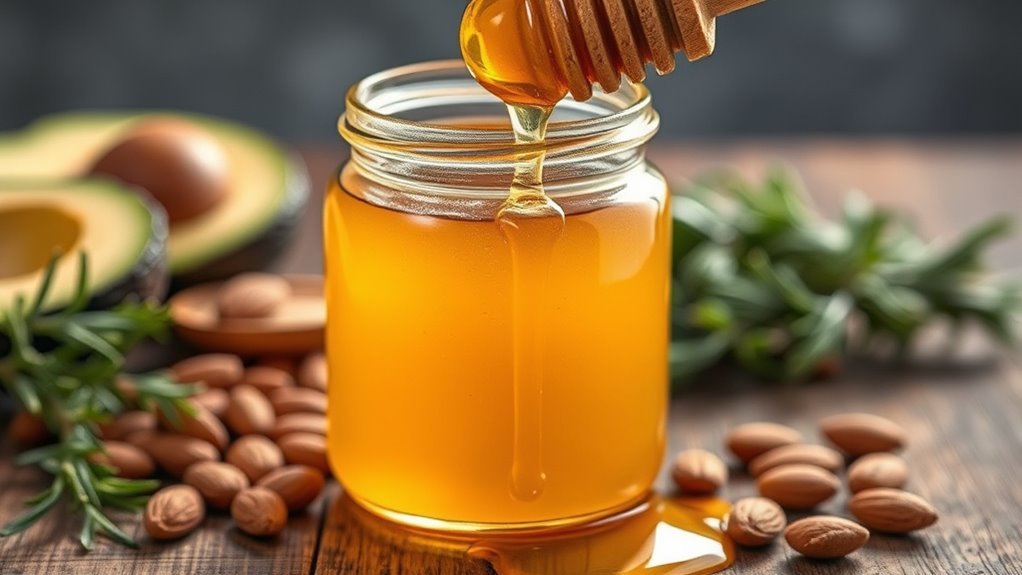You can have honey on a keto diet, but it’s important to do so in moderation. Honey is high in carbohydrates, with one tablespoon containing about 17 grams, which can disrupt ketosis. It can spike your blood sugar and cause an insulin response. If you choose to use honey, consider small amounts and balance it with low-carb alternatives like stevia or erythritol. There are effective strategies to enjoy sweetness while staying on track—explore those options to learn more.
Understanding the Keto Diet and Its Principles

While many diets promise quick weight loss, the keto diet stands out due to its unique approach to macronutrients. By considerably reducing carbohydrates and increasing fats, you shift your body into ketosis, a metabolic state that burns fat for energy. This method offers various keto benefits, including improved mental clarity, increased energy levels, and appetite control. However, it’s crucial to be aware of dietary restrictions that accompany this lifestyle. You’ll need to avoid high-carb foods like grains, sugars, and most fruits, which can be challenging for some. Embracing the keto diet means finding creative ways to enjoy meals that fit within your new framework, ultimately giving you the freedom to reshape your relationship with food while pursuing your health goals.
Nutritional Profile of Honey

Honey, often hailed for its natural sweetness, has a complex nutritional profile that warrants attention, especially for those on specific diets like keto. You might appreciate its potential benefits, but it’s vital to take into account the drawbacks as well. Here are some key points about honey’s nutritional aspects:
Honey’s nutritional complexity is crucial for those on diets like keto, balancing its benefits with potential drawbacks.
- Rich in Antioxidants: Honey contains various antioxidants that can help combat oxidative stress.
- Natural Energy Source: It provides quick energy due to its natural sugars, which can be beneficial during workouts.
- Potential for Allergies: Some individuals may experience allergic reactions, highlighting the need for caution.
While honey offers several advantages, its high sugar content can hinder your keto goals. Balancing these honey benefits and drawbacks is essential for informed dietary choices.
Carbohydrates in Honey: A Closer Look

When considering honey on a keto diet, it’s important to look closely at its carbohydrate content. A single tablespoon of honey contains about 17 grams of carbohydrates, which can greatly impact your state of ketosis. Understanding this balance can help you make informed choices about incorporating honey into your low-carb lifestyle.
Honey’s Carb Content
A closer look at honey reveals that it packs a surprising amount of carbohydrates, making it crucial for those on a keto diet to contemplate its impact. Honey primarily consists of sugars, so understanding its carb content is key.
- Most honey varieties contain about 17 grams of carbs per tablespoon.
- The glycemic index of honey can vary, impacting blood sugar levels differently.
- Consider keto substitutes like stevia or erythritol for a lower-carb option.
While honey offers potential health benefits, its high carb content may disrupt ketosis. If you’re maneuvering a keto lifestyle, being mindful of your carbohydrate intake, including the sweet allure of honey, is essential for maintaining your desired metabolic state.
Impact on Ketosis
Although many people enjoy honey for its natural sweetness and potential health benefits, its carbohydrate content can considerably impact ketosis. A single tablespoon of honey contains about 17 grams of carbohydrates, which can easily exceed your daily limit on a keto diet. This makes it challenging for you to maintain ketosis, as your body relies on low carbohydrate intake to stay in fat-burning mode. If you’re looking for alternatives, consider honey substitutes like erythritol or stevia, which provide sweetness without the carbs. These options can help you satisfy your sweet tooth while supporting ketosis maintenance. Ultimately, staying informed about the carb content in foods can empower you to make choices that align with your dietary goals.
The Impact of Honey on Ketosis
When you’re on a keto diet, understanding how honey’s carbohydrate content affects your state of ketosis is essential. The sugar in honey can spike your blood sugar levels, which might disrupt ketosis. It’s also worth exploring alternatives to honey that align better with your dietary goals.
Carbohydrate Content Analysis
Honey, often hailed for its natural sweetness and potential health benefits, poses a significant challenge for those adhering to a ketogenic diet. When you consider carbohydrate sources, honey is particularly high in sugars, which can disrupt your state of ketosis. While it may be tempting to include honey in your meals, carb counting reveals the following:
- A single tablespoon of honey contains about 17 grams of carbohydrates.
- This amount can easily exceed your daily carb limit on a keto diet.
- Even small servings can hinder your progress toward ketosis.
Understanding these factors is essential. If you’re looking to maintain your keto lifestyle, it’s wise to explore alternative sweeteners that align better with your dietary goals.
Effects on Blood Sugar
Including honey in your diet can greatly affect blood sugar levels, which is a key consideration for anyone on a ketogenic diet. Honey is high in natural sugars, primarily fructose and glucose, which can spike your blood sugar levels. This spike triggers an insulin response, potentially disrupting ketosis. For those aiming for stable energy and fat-burning, maintaining low blood sugar is essential. If you choose to incorporate honey, it’s important to monitor your body’s response. Individual reactions can vary, and some may find that even small amounts of honey can hinder their ketogenic goals. Ultimately, understanding how honey interacts with your blood sugar and insulin response is critical for making informed dietary choices on your keto journey.
Alternatives to Honey
While honey might seem like a natural sweetener, it can greatly impact ketosis, leading many to seek alternatives that align better with their ketogenic lifestyle. Fortunately, there are several keto-friendly options you can enjoy without derailing your progress:
- Stevia: A zero-calorie sweetener derived from the leaves of the stevia plant, it doesn’t affect blood sugar levels.
- Erythritol: A sugar alcohol that has minimal calories and carbohydrates, making it a popular choice among keto dieters.
- Monk Fruit Sweetener: Another natural sweetener that’s calorie-free and doesn’t spike insulin levels, perfect for your keto needs.
These natural sweeteners and keto-friendly syrups allow you to satisfy your sweet tooth while maintaining ketosis. Enjoy the freedom of flavor without the carbs!
Alternatives to Honey for Sweetening
If you’re on a keto diet and looking to satisfy your sweet tooth without using honey, there are several alternatives that can fit into your low-carb lifestyle. Stevia is a popular choice, and its benefits include being calorie-free and having little to no effect on blood sugar levels. This makes it an excellent option for those monitoring their carb intake. Another great alternative is monk fruit, which is also low in carbs and offers a sweet flavor without the calories. Both sweeteners can easily be used in beverages, baked goods, and various recipes. By choosing these alternatives, you can enjoy sweetness without compromising your keto goals, allowing you the freedom to indulge your cravings responsibly.
Moderation: Can You Enjoy Honey on Keto?
Many people on a keto diet wonder about the role of honey in their eating plan, especially after exploring alternatives like stevia and monk fruit. While honey isn’t typically low in carbs, it can be included in moderation for its potential benefits. Here’s how you can enjoy honey while maintaining keto flexibility:
Many on a keto diet ponder honey’s role, as it can be included in moderation for its benefits.
- Nutrient-Rich: Honey contains antioxidants and vitamins, offering some health benefits.
- Satisfies Sweet Cravings: A small amount can help satisfy your sweet tooth without derailing your diet.
- Potential Energy Boost: It can provide a quick source of energy, especially useful for workouts.
Tips for Incorporating Honey Into a Keto Lifestyle
Incorporating honey into your keto lifestyle can be a delightful experience, especially when done thoughtfully. To enjoy honey without derailing your ketones, consider using it sparingly. Start with small amounts, perhaps adding a teaspoon to a smoothie or drizzling it over low-carb yogurt. Balance it with keto-friendly sweeteners like stevia or erythritol to enhance sweetness without excessive carbs. This way, you can enjoy the unique flavor of honey while keeping your carb intake in check. Explore honey substitutes like monk fruit or allulose if you want variety. Always track your macros and listen to your body. Remember, moderation is key; a little honey can go a long way in satisfying your sweet cravings while staying within your keto goals.
Final Thoughts on Honey and the Keto Diet
While honey can be a tempting addition to your keto diet, it’s vital to weigh the benefits against its carbohydrate content. If you’re committed to a keto lifestyle, moderation is key. Here are some things to reflect on:
- Natural Sweetener: Honey can provide a healthier alternative to artificial sweeteners, offering unique flavors and potential health benefits.
- Antioxidant Properties: It’s rich in antioxidants, which may support overall health and wellness.
- Energy Boost: A small amount can give you a quick energy boost, useful during high-intensity activities.
Ultimately, enjoying honey in small quantities might be possible without derailing your goals, but always track your carbs. Balancing the honey benefits with your keto needs is essential for success.
Frequently Asked Questions about Honey on Keto Diet
1. Can I include honey in my keto diet?
While honey is a natural sweetener, it is high in carbohydrates and sugars, making it generally unsuitable for a strict ketogenic diet. The goal of keto is to keep your daily carb intake low, usually around 20-50 grams, and even a small amount of honey can exceed this limit. However, some people on a more liberal low-carb diet might choose to use honey sparingly.
2. What are the carbohydrate contents of honey?
One tablespoon of honey contains approximately 17 grams of carbohydrates, predominantly in the form of sugars. For those on a keto diet, this amount can easily take up a significant portion of your daily carb allowance. Therefore, it’s important to consider these values if you are thinking about adding honey to your meals.
3. Are there any alternative sweeteners for a keto diet?
Yes, there are several low-carb sweeteners suitable for a keto diet. Popular options include stevia, erythritol, monk fruit, and sucralose. These sweeteners have minimal to no carbohydrates and won’t significantly impact your blood sugar levels, making them excellent substitutes for honey in recipes and beverages.
4. Can I use honey in small amounts on a keto diet?
If you’re following a more flexible low-carb approach rather than a strict keto diet, using honey in small amounts might be feasible. However, it’s crucial to monitor your overall carbohydrate intake to ensure you stay within your limits. Remember that even a teaspoon of honey can add up quickly, so moderation is key.
5. What are the health benefits of honey, and are they applicable on keto?
Honey has various health benefits, including its antioxidant properties, potential to soothe sore throats, and ability to provide quick energy. However, these benefits are generally outweighed by the high sugar content when considering a keto lifestyle. If you are strictly adhering to keto, it may be better to focus on other sources of nutrients that align with your dietary goals.
References
- https://www.healthline.com/nutrition/honey-on-keto
- https://www.ncbi.nlm.nih.gov/pmc/articles/PMC5563202/
- https://www.ketodietapp.com/Blog/post/Can-You-Eat-Honey-on-Keto
- https://www.medicalnewstoday.com/articles/322869
- https://www.researchgate.net/publication/337687500_Honey_and_the_ketogenic_diet
- https://www.webmd.com/diet/what-to-eat-on-a-keto-diet
- https://www.mayoclinic.org/healthy-lifestyle/nutrition-and-healthy-eating/expert-answers/honey-and-the-keto-diet/faq-20458634
- https://www.bbcgoodfood.com/howto/guide/what-keto-diet
- https://www.verywellfit.com/can-you-eat-honey-on-keto-5113170


